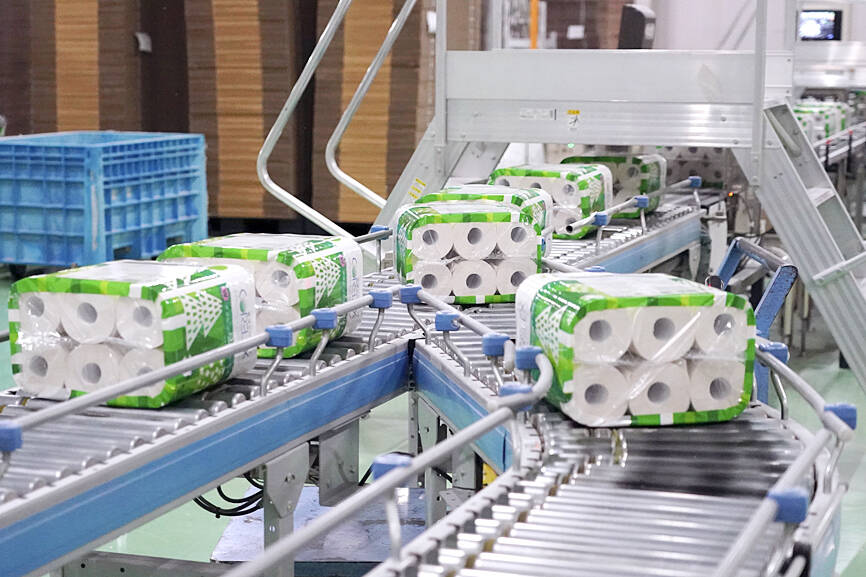Luxurious toilets complete with heated seats and cleansing jets of water are so common in Japan that they have become synonymous with its culture. They are now taking off in the US — thanks in part due to pandemic-induced shortages of toilet paper.
Japan’s largest toilet maker, Toto Ltd, which introduced the Washlet in 1980 as a high-tech version of the bidet, said sales of the device more than doubled in the first quarter of 2020 from a year earlier, and jumped 18 percent in the first quarter of this year from a year earlier.
The outlook for further growth is bright, despite the “toilet paper panic” being over, company executive Shinya Tamura said.

Photo: Bloomberg
“Although Washlet sales in the US have grown significantly, they are still far behind the penetration rate in Japan,” said Tamura, who manages Toto’s housing equipment business in North America and Europe. “I still see a great room for growth in the US.”
Toto originally introduced the electronic Washlet for hospital patients with hemorrhoids. According to the Japan Sanitary Equipment Industry Association, more than 80 percent of Japanese households now contain such a toilet, and such devices are now ubiquitous in hotels, restaurants, department stores and other public restrooms.
Their appeal is also growing internationally. The company reported first-quarter overseas sales of ¥39 billion (US$278.14 million) across their product lines, an 8 percent increase from the same period last year.
China accounted for 43 percent of sales, followed by the US at 32 percent.
Toto started exporting the Washlet to the US in the 1980s and spent decades familiarizing foreign consumers with the product and developing networks.
The spike in sales during the COVID-19 pandemic was “a situation where the seeds sown for decades are finally flowering,” said Nariko Yamashita, who worked as part of the marketing team in the US during the pandemic.
In 2017, Amazon featured the Washlet in its Thanksgiving gift ranking, which Tamura said “paved the way for the sales boom when the pandemic hit.”
The product “flew off the shelves” in the US in 2020 as “kitchen paper, tissues and toilet paper completely disappeared from supermarkets,” Tamura said, adding that social media commentary about the benefits of bidets helped drive demand.
In addition to the US, Tamura sees potential in Taiwan, Vietnam, and other Southeast Asian nations.
Sales in China, however, are “quite sluggish” amid COVID-19 lockdowns and government efforts to suppress property prices.
“But this just means that the market scale has grown big enough to be sensitive to and easily affected by the economy,” he said.

SEEKING CLARITY: Washington should not adopt measures that create uncertainties for ‘existing semiconductor investments,’ TSMC said referring to its US$165 billion in the US Taiwan Semiconductor Manufacturing Co (TSMC, 台積電) told the US that any future tariffs on Taiwanese semiconductors could reduce demand for chips and derail its pledge to increase its investment in Arizona. “New import restrictions could jeopardize current US leadership in the competitive technology industry and create uncertainties for many committed semiconductor capital projects in the US, including TSMC Arizona’s significant investment plan in Phoenix,” the chipmaker wrote in a letter to the US Department of Commerce. TSMC issued the warning in response to a solicitation for comments by the department on a possible tariff on semiconductor imports by US President Donald Trump’s

‘FAILED EXPORT CONTROLS’: Jensen Huang said that Washington should maximize the speed of AI diffusion, because not doing so would give competitors an advantage Nvidia Corp cofounder and chief executive officer Jensen Huang (黃仁勳) yesterday criticized the US government’s restrictions on exports of artificial intelligence (AI) chips to China, saying that the policy was a failure and would only spur China to accelerate AI development. The export controls gave China the spirit, motivation and government support to accelerate AI development, Huang told reporters at the Computex trade show in Taipei. The competition in China is already intense, given its strong software capabilities, extensive technology ecosystems and work efficiency, he said. “All in all, the export controls were a failure. The facts would suggest it,” he said. “The US

The government has launched a three-pronged strategy to attract local and international talent, aiming to position Taiwan as a new global hub following Nvidia Corp’s announcement that it has chosen Taipei as the site of its Taiwan headquarters. Nvidia cofounder and CEO Jensen Huang (黃仁勳) on Monday last week announced during his keynote speech at the Computex trade show in Taipei that the Nvidia Constellation, the company’s planned Taiwan headquarters, would be located in the Beitou-Shilin Technology Park (北投士林科技園區) in Taipei. Huang’s decision to establish a base in Taiwan is “primarily due to Taiwan’s talent pool and its strength in the semiconductor

French President Emmanuel Macron has expressed gratitude to Hon Hai Precision Industry Co (鴻海精密) for its plan to invest approximately 250 million euros (US$278 million) in a joint venture in France focused on the semiconductor and space industries. On his official X account on Tuesday, Macron thanked Hon Hai, also known globally as Foxconn Technology Group (富士康科技集團), for its investment projects announced at Choose France, a flagship economic summit held on Monday to attract foreign investment. In the post, Macron included a GIF displaying the national flag of the Republic of China (Taiwan), as he did for other foreign investors, including China-based